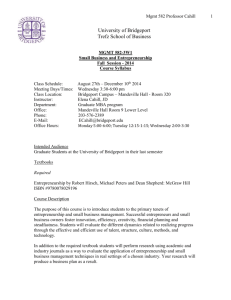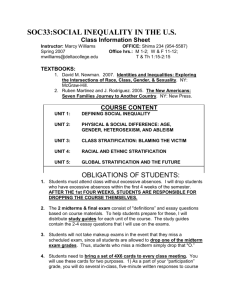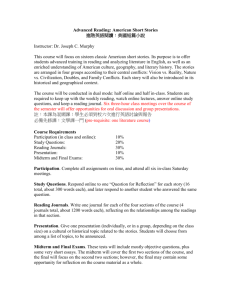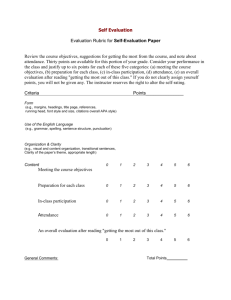IONA - University of Bridgeport
advertisement
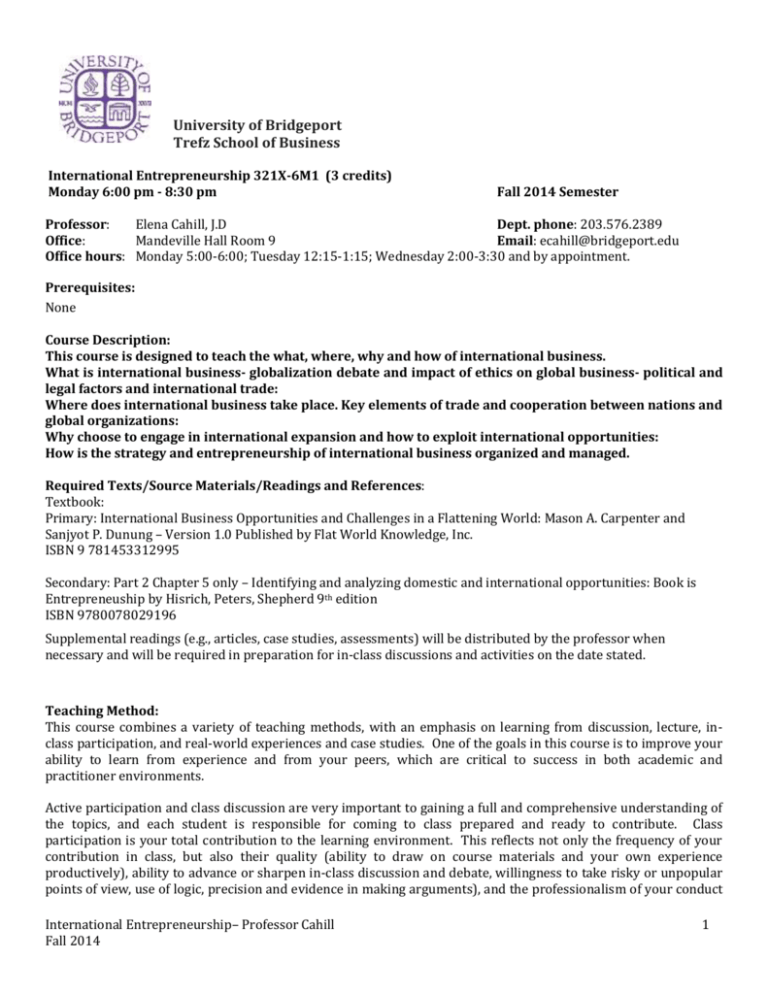
University of Bridgeport Trefz School of Business International Entrepreneurship 321X-6M1 (3 credits) Monday 6:00 pm - 8:30 pm Fall 2014 Semester Professor: Elena Cahill, J.D Dept. phone: 203.576.2389 Office: Mandeville Hall Room 9 Email: ecahill@bridgeport.edu Office hours: Monday 5:00-6:00; Tuesday 12:15-1:15; Wednesday 2:00-3:30 and by appointment. Prerequisites: None Course Description: This course is designed to teach the what, where, why and how of international business. What is international business- globalization debate and impact of ethics on global business- political and legal factors and international trade: Where does international business take place. Key elements of trade and cooperation between nations and global organizations: Why choose to engage in international expansion and how to exploit international opportunities: How is the strategy and entrepreneurship of international business organized and managed. Required Texts/Source Materials/Readings and References: Textbook: Primary: International Business Opportunities and Challenges in a Flattening World: Mason A. Carpenter and Sanjyot P. Dunung – Version 1.0 Published by Flat World Knowledge, Inc. ISBN 9 781453312995 Secondary: Part 2 Chapter 5 only – Identifying and analyzing domestic and international opportunities: Book is Entrepreneuship by Hisrich, Peters, Shepherd 9th edition ISBN 9780078029196 Supplemental readings (e.g., articles, case studies, assessments) will be distributed by the professor when necessary and will be required in preparation for in-class discussions and activities on the date stated. Teaching Method: This course combines a variety of teaching methods, with an emphasis on learning from discussion, lecture, inclass participation, and real-world experiences and case studies. One of the goals in this course is to improve your ability to learn from experience and from your peers, which are critical to success in both academic and practitioner environments. Active participation and class discussion are very important to gaining a full and comprehensive understanding of the topics, and each student is responsible for coming to class prepared and ready to contribute. Class participation is your total contribution to the learning environment. This reflects not only the frequency of your contribution in class, but also their quality (ability to draw on course materials and your own experience productively), ability to advance or sharpen in-class discussion and debate, willingness to take risky or unpopular points of view, use of logic, precision and evidence in making arguments), and the professionalism of your conduct International Entrepreneurship– Professor Cahill Fall 2014 1 (attendance, punctuality, preparedness, and showing respect to all class members and class contributions). Class attendance and participation are required and factor into the course grade. Assessment of Learning: In-class and Collaborative Case Work We will work collaboratively on a variety of in-class activities, including case studies, discussion of news and current events, problem solving and analytical exercises, and relevant assessments pertaining to the topic of focus. I will provide students with instructions, documents and resources that require advance preparation, and any other materials that can be examined in a timely manner during class (i.e., less than 15 minutes) will be distributed during class time for “hands-on” practical work. Individual contributions each week will be factored into the course participation grade, and this work cannot be made up. Midterm and Final Exams The midterm and final exams may consist of multiple choice, true/false, and short answer questions. The final exam will not be cumulative; it will include the material covered after the midterm exam. Course Evaluation and Grading: Class Attendance with homework Midterm Exam Case Presentations Final Exam Total 15% 35% 15% 35%_ 100% University of Bridgeport Grading Scale: Numeric Grade Scale Letter Grade Value 93 A 90-92 A87-89 B+ 83-86 B 80-82 B77-79 C+ 73-76 C 70-72 C67-69 D+ 63-66 D 60-62 DLess than 60 F Evaluation Excellent. Work of exceptional quality Above-average achievement. Minimal achievement. Below average. Quality Points 4.00 3.67 3.33 3.00 2.67 2.33 2.00 1.67 1.33 1.00 .67 University of Bridgeport Academic Policies: As a UB policy, it is expected that each student that attends one hour of classroom instruction will require a minimum of two hours of out of class student work each week for approximately fifteen weeks for one semester. Special Accommodations: All efforts will be made to accommodate students with physical disabilities or special needs. Academic Honesty Standards: It is the students’ responsibility to familiarize himself or herself with and adhere to the standards set forth in the policies on cheating and plagiarism as defined in the UB Student Handbook. A high standard of ethical conduct is expected of students in their academic activities. The University does not tolerate cheating in any form. This term is used to include dishonest use of another individual's aid in preparation of written assignments as well as during a classroom-testing period. The standard procedures for the preparation International Entrepreneurship– Professor Cahill Fall 2014 2 of term papers and the like, as established by the English Department, form the basis for decisions in cases of plagiarism (See Definition of Plagiarism). The student must be familiar with those regulations. Disciplinary action will be imposed, not only in cases of detected cheating, but also for violations of such regulations mentioned above. In the latter, a violation of the regulation without consideration of the motive involved will be deemed sufficient cause for action. Instructors have the right to determine the appropriate penalty for academic dishonesty in their own classes; generally, however, such acts will result in a failing grade for the assignment and/or the course as a whole. The penalty for subsequent acts of academic dishonesty may include expulsion. Definition of Plagiarism: INTENTIONAL AS WELL AS UNINTENTIONAL FAILURE TO ACKNOWLEDGE SOURCES AS WELL AS THE USE OF COMMERCIALLY AVAILABLE SO-CALLED "RESEARCH PAPERS" WITHOUT FULL RECOGNITION OF THE SOURCE. Students are responsible for distinguishing clearly between their own facts, ideas and conclusions and those of other sources. To use someone else's words, opinions, or conclusions without giving them credit is plagiarism. Students must be able to distinguish their own ideas, conclusions, discoveries, etc., from those read or heard. My Rules: Late class arrivals and absences: Attendance will be taken at the beginning of each class and students who arrive late will have their lateness documented. Three late arrivals will convert into one class absence. Three class absences will result in a 10-point deduction of your course participation grade. Advise me in advance of anticipated conflicts. If you know you will be missing a class in which an assignment is due, advise me by e-mail and submit the assignment to me or bring it to the School of Business office prior to class to receive credit. Inappropriate behavior: I will ask you to leave the class if you are disruptive, including but not limited to texting, surfing the Web, demonstrating a disrespectful attitude, or excessive talking. I encourage an environment of mutual respect and courtesy. Late assignment submissions: Late assignments, projects and papers will have 10 points deducted per day. No work will be accepted after one week beyond the due date, and a grade of zero will be recorded. Extenuating circumstances may be considered, and must be discussed with the professor as soon as possible. Invest in a stapler. Any written work that is not stapled will not be accepted. No folded corners, no paper clips, and no loose pages will be accepted. Hard copy research paper submissions must be provided to the professor in addition to electronic research paper submissions. Course Schedule: Classes 8/25 Topic Welcome & Course Overview What is international business and what is trade theory 9/8 Culture and Business and World Economies 9/15 Global and Regional Economic Cooperation and the International Monetary System 9/22 Foreign Exchange and Global Capital Markets and International Expansion and Global Market Opportunity Assessment 9/29 Exporting, Importing and Global Sourcing and Strategy and International Business International Entrepreneurship– Professor Cahill Fall 2014 Readings & Assignments Due Chapter 1 and 2 Pages 7-50 Chapter 3 and 4 Pages 51-118 Chapter 5 and 6 Pages 123-179 Chapter 7 and 8 Pages 181-234 Chapter 9 and 10 Pages 237-288 3 10/6 Discuss Case Preparations and Review for Midterm 10/13 MIDTERM Chapters 1-10 10/20 Global Entrepreneurship and Intrapreneurship and Effective Global Management Chapter 11 and 12 Pages 289-348 10/27 Global Innovation and Competing Effectively in the Global Market, Distribution and Supply Chain 11/3 Understanding the role of Financing and Accounting in Global Competitive Advantage 11/10 Preparing the Case Analysis for Discussion and Presentation in Class Cases to be chosen 11/17 Case discussions Cases to be chosen 11/24 Case discussions Cases to be chosen 12/1 Individual Case Presentations 12/8 FINAL Chapter 13 and 14 Pages 351- 397 Chapter 15 Pages 402-423 Chapters 11-15 - Note: I reserve the right to modify the course schedule at any time, and will announce any changes to the class appropriately. International Entrepreneurship– Professor Cahill Fall 2014 4
